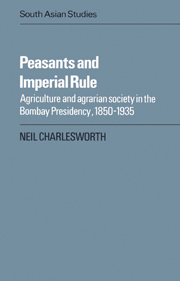Book contents
- Frontmatter
- Contents
- List of maps and tables
- Preface
- Note on technical terms and references
- Maps
- 1 Introduction: the peasant in India and Bombay Presidency
- 2 The village in 1850: land tenure, social structure and revenue policy
- 3 The village in 1850: land and agriculture
- 4 Indebtedness and the Deccan Riots of 1875
- 5 Continuity and change in the rural economy, 1850–1900
- 6 The Bombay peasantry, 1850–1900: social stability or social stratification?
- 7 The agricultural economy, 1900–1935: the critical watershed?
- 8 The impact of government policy, 1880–1935
- 9 The peasant and politics in the early twentieth century
- 10 Conclusions: the problem of differential commercialisation
- Glossary
- Bibliography
- Index
1 - Introduction: the peasant in India and Bombay Presidency
Published online by Cambridge University Press: 10 December 2009
- Frontmatter
- Contents
- List of maps and tables
- Preface
- Note on technical terms and references
- Maps
- 1 Introduction: the peasant in India and Bombay Presidency
- 2 The village in 1850: land tenure, social structure and revenue policy
- 3 The village in 1850: land and agriculture
- 4 Indebtedness and the Deccan Riots of 1875
- 5 Continuity and change in the rural economy, 1850–1900
- 6 The Bombay peasantry, 1850–1900: social stability or social stratification?
- 7 The agricultural economy, 1900–1935: the critical watershed?
- 8 The impact of government policy, 1880–1935
- 9 The peasant and politics in the early twentieth century
- 10 Conclusions: the problem of differential commercialisation
- Glossary
- Bibliography
- Index
Summary
The peasantry is not just ‘the awkward class’ but also the typical class. Historically, most men's occupation has been within small-scale agriculture and examining change and development in this context is therefore vital to any realistic understanding of the evolution of the modern world. That is the root justification for this study of the agrarian economy and society of one major province of British India, the Bombay Presidency, in the period between the mid-nineteenth century and the 1930s. As a methodology, in the face of the daunting potential scope of the subject, three distinct areas of enquiry will predominate. Firstly, we need to investigate the economics of agriculture and changes within it; the financing of operations, the types of crops grown, the methods employed and, so far as possible, the levels and trends in output performance. Yet agriculture does not operate in a vacuum. Land tenure and the structure of power and status in the village determine its context. In turn, agricultural developments can create agrarian change: extending commercialisation of agriculture, for example, might prove an engine of revolution within traditional patterns of landownership, land tenure and peasant social relationships. Thirdly, in British India, the imperial rulers, dependent on the village for revenue and the mass acquiescence which guaranteed their political security, were always intimately concerned with rural issues. So our study must also, in part, be a study of British agrarian and revenue policy and its effects.
- Type
- Chapter
- Information
- Peasants and Imperial RuleAgriculture and Agrarian Society in the Bombay Presidency 1850–1935, pp. 1 - 16Publisher: Cambridge University PressPrint publication year: 1985

